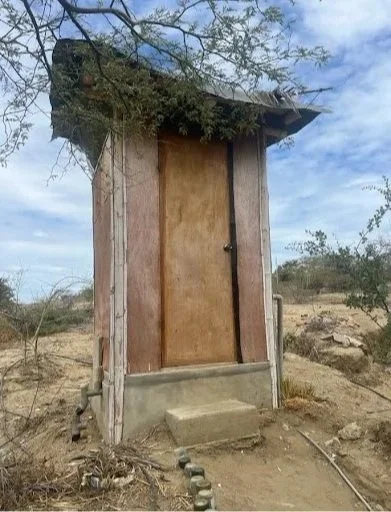Mindful Living: A look into how the EcoSwell house conserves water
Our vision is “A future in which people and nature can thrive in unison,” and accomplishing this begins in the backyard of the EcoSwell house.
Volunteer-Interns preparing to harvest the dry toilet compost and switch vaults to start a new batch - a 6-monthly process.
Walking up the path to our headquarters at EcoSwell, you will notice Algarrobo trees reaching toward the white gate. These trees, both native and endangered in Northern Peru, provide shade and a home to native and endemic birds such as the Peruvian Plantcutter. The office sits in a peaceful location just beside the beach and accommodates a constant stream of volunteer-interns throughout the year. We enjoy utilizing innovative, sustainable solutions to minimize our environmental impact, always considering our carbon footprint and use of resources.
On arrival, volunteer-interns might instinctively head to one of the indoor toilets. But around the side of the house lies one of our key sustainability features: The Dry Toilet. It’s designed to separate solids from liquids during use, and mulch (dried leaves from the Algarrobo tree and surrounding vegetation) is scooped over the solid feces every time it is used in order to reduce moisture, trap air and provide carbon in the form of dry organic matter, all of which aid to ensure “aerobic” decomposition of the solid waste and therefore controlling the odors inside the toilet cabin (basically, this means there is no bad smell!).
So, how does it work? The toilet has two vaults or compartments and their use is rotated every six months. While one is in use for 6 months, the other is slowly composting the waste. While a typical toilet uses around 6 liters of water per flush, the EcoSwell dry toilet system uses no water at all, and the compost produced is then used in EcoSwell’s community greening and reforestation efforts (weekly planting days with Lobitos families and a reforestation site in town) by the Reforestation & Ecosystem Restoration volunteer-interns.
In the “vault-swap”, 450 liters of compost were harvested! The dry toilet is a great example of how small changes can add up to big impacts. If local staff and volunteers in the house were to use the dry toilet once a day for 4 months, this would save more than 10,000 liters of water!
This equates to 10 tanks of water storage, which have to be purchased and delivered to the EcoSwell house and every other house in Lobitos from local water truck delivery suppliers!
The EcoSwell Dry Toilet
Interns using compost from the dry toilet in the reforestation site.
Our water impact goes beyond the dry toilet, and we are mindful of its use throughout the whole house. This hyper-arid region of Northern Peru faces severe problems regarding water supply and sanitation, experiencing frequent water shortages. In Lobitos we have an out-dated public water infrastructure (water supply grid) fallen into disrepair and non-functioning for almost 3 years to date, as well as a non-existing wastewater treatment system! These challenges have inspired EcoSwell to develop decentralized household strategies to minimize wastewater production, which all volunteers learn about and use during their stay.
Whilst showering, a volunteer will see that the water runs via a pipe to water the back garden, which as a result is filled with flowery native flora and fauna. Volunteers also learn to turn off the water tap frequently while showering, and from first-hand experience, this really makes you think about how much water is being wasted just while shampooing your hair or grabbing a bottle of soap! A small greywater vetiver wetland next to the kitchen is watered similarly via pipes from the kitchen sink and laundry machine, which you can see in the photo below.
Interns digging trenches that help to make sure water reaches the Vetiver plants
“Vetiver” plants are a type of grass that can provide “phytoremediation” or bio-treatment to wastewater, and although not native to northern Peru, Vetiver is unable to become invasive (it is a sterile cultivar), so EcoSwell uses this plant to treat greywater from the kitchen and laundry. EcoSwell’s Water & Sanitation interns work to upkeep the plants and the trenches that keep this process running smoothly.
A very busy area of the house is the kitchen, where our incredible chef, Meche, cooks both breakfast and lunch. Meche is a wonderful cook, so food is rarely wasted, but even when there are scraps, nothing goes to waste. All scraps are emptied into a kitchen organic waste bin, which is regularly disposed of into a larger bin in the back garden for composting. This compost is also monitored and eventually used during the “Planting Days,” where EcoSwell interns have the opportunity to plant native trees together with local families in public spaces right outside their houses while promoting awareness of the special and unique “Dry Forest” ecosystem in the Lobitos community.
Interns on planting day!
We realize that our actions are an important role model for the community. Sustainable measures such as the dry toilet and greywater runoff going to the garden are tested at the house so that eventually, they can be implemented in other homes and businesses across Lobitos. For example, another local NGO has been working to build a dry-toilet at their horse-ranch after they learned about EcoSwell's experience with a no-smell, no-water toilet that helps fertilize local plants!
As the organization keeps growing, EcoSwell continues to work from the ground up. Our actions as an international NGO are focused on working in harmony with nature, and this is a mindset that begins with sustainable practices at home. We share our circular and minimum-waste water system with volunteers and staff to bring these practices to various parts of the world. Often, we hear about how mindsets change in our volunteers who go home appreciating the scarcity of water and become a lot more eco-conscious about their use of this valuable resource!
The EcoSwell house.
Some notes from a volunteer intern at the EcoSwell house:
Though it may sound surprising, living without excess has been a favorite part of my time with EcoSwell. Extra care while showering, brushing my teeth, or even washing some fruit for a snack causes me to take a moment to appreciate something I often take for granted back in my home country. I love that interns and staff all must work together to conserve water; we hold each other accountable, teach and learn from one another, and because of this, have built a community that is centered around mindfulness and gratitude.






